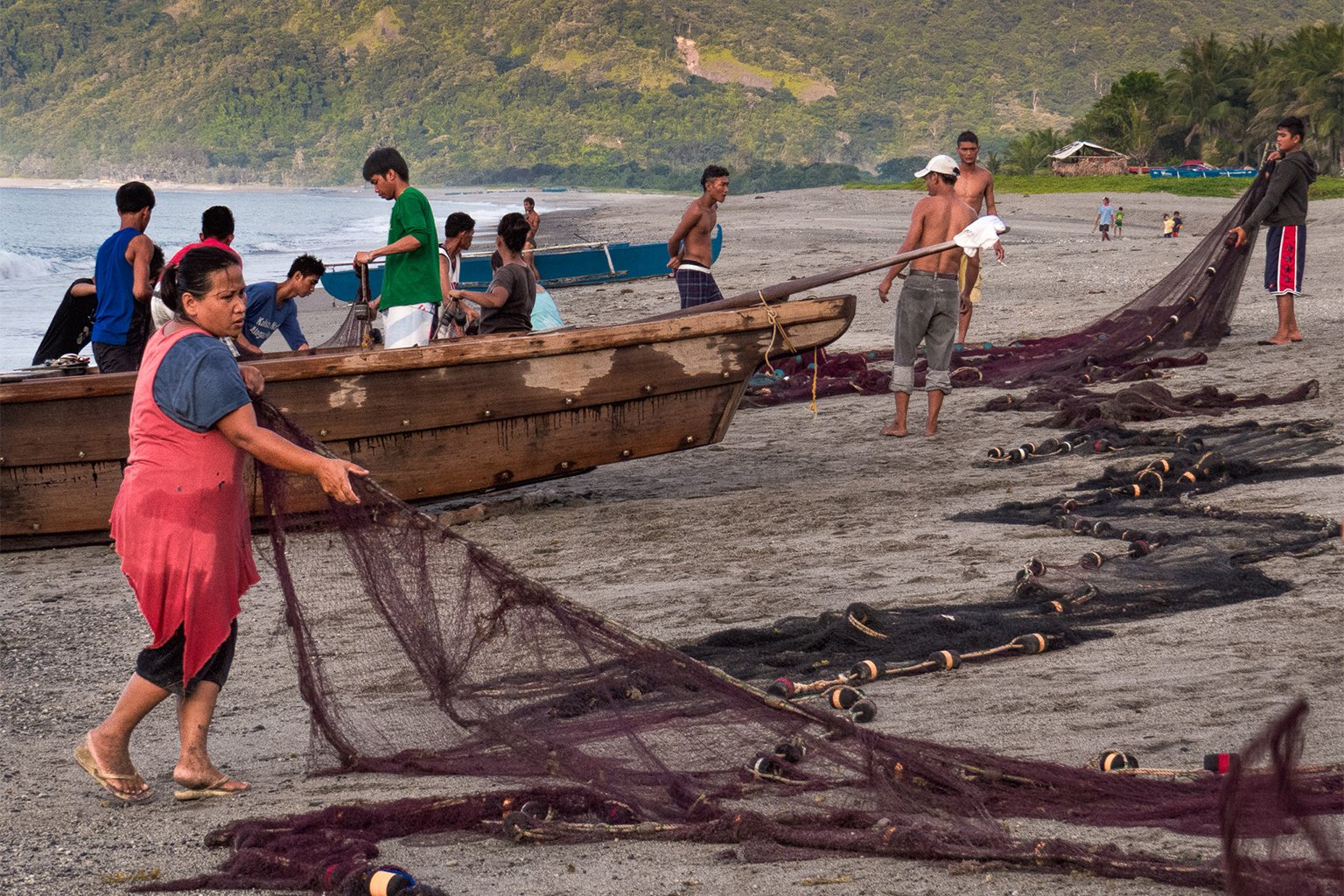- The second United Nations Oceans Conference took place from June 27 to July 1 in Lisbon, focusing on the protection of life under water, as dictated by U.N. Sustainable Development Goal No. 14.
- The conference was originally meant to have taken place in 2020, but was delayed due to the COVID-19 pandemic.
- While nations, NGOs and other entities made hundreds of conservation commitments, including pledges to expand marine protected areas, end destructive fishing practices, and fund conservation efforts, experts say there is still a lot of work to be done to protect our oceans.
- Coalitions of small-scale fishers and Indigenous peoples also voiced their concerns about being excluded from important conservation dialogues.
LISBON — The United Nations Oceans Conference (UNOC) concluded on July 1 in Lisbon after a full five days of discussions and events focused on achieving a shared goal: U.N. Sustainable Development Goal No. 14 (SDG14), which aims to protect life below water. While representatives of governments, NGOs and other entities made hundreds of conservation commitments, experts say that there is still a lot of work to be done to protect our oceans.
SDG14 has been divided into 10 targets: reduce marine pollution; protect and restore ecosystems; reduce ocean acidification; ensure that fishing is done sustainably; conserve coastal and marine areas; end subsidies that contribute to harmful fishing practices; increase economic benefits from the sustainable use of marine resources; increase scientific knowledge, research and technology for ocean health; support small-scale fishers; and implement and enforce international law pertaining to the sea. Some of the targets were meant to be achieved in 2020, whereas others are to be addressed by 2030.
Peter Thomson, the U.N. secretary-general’s special envoy for the ocean, said during a press briefing on June 25 that achieving these goals was essential for “our survival on the planet.”
“You can’t have a healthy planet without the ocean, and the ocean’s health is immeasurably in decline,” Thomson said. However, he added he’s seen a “wave of positivity” as nations realized the severity of the situation and turned their attention to ocean conservation efforts.
This year’s UNOC, co-hosted by Portugal and Kenya, was originally supposed to have taken place in 2020, but was delayed due to the COVID-19 pandemic. More than 6,000 participants from more than 150 countries attended the conference, according to organizers, including 24 heads of state and government. This is the U.N.’s second ocean conference; the first UNOC took place in New York in 2017.
Representatives adopted a statement called the Lisbon Declaration, which presents a series of science-based actions needed to deal with the “global emergency facing the ocean,” while taking into account the challenges small islands and developing nations may have in implementing these actions.
Participants registered nearly 700 commitments at the conference, according to organizers. Among them, many countries announced new protective measures within their exclusive economic zones (EEZs), areas of the ocean that extend 200 nautical miles (370 kilometers) from each nation’s coasts. For instance, Zac Goldsmith, a U.K. minister for the Pacific region, announced that more than 100 nations have now pledged to protect 30% of their oceans by 2030 by joining the High Ambition Coalition for Nature and People. The goal of protecting 30% of the world’s land and sea area by the decade’s end is also a target under the U.N. Convention on Biological Diversity (CBD).
Several countries announced new marine protected areas (MPAs). For instance, Colombia enlarged the no-take zone in the Malpelo Sanctuary, a critical habitat for many marine species, including whale sharks and tuna, and created three new MPAs and marine management areas (MMAs). These new expansions, if fully implemented, will allow Colombia to achieve the goal of protecting 30% of its waters eight years ahead of the 2030 deadline.
Other announcements included Guatemala’s pledge to create or expand eight MPAs to encompass 13% of the nation’s EEZ; Uruguay’s promise to expand an existing MPA in a whale and dolphin sanctuary; and Portugal’s move to expand its MPAs in the Azores Archipelago and Madeira.

A group of philanthropic organizations, including the Bezos Earth Fund and Bloomberg Philanthropies, committed to invest a total of $1 billion in ocean conservation efforts, including the creation of MPAs and other habitat protections, over the next eight years. This commitment is roughly equal to all philanthropic funding that has been dedicated to MPAs and habitat protection over the past decade, according to a statement by the organizations.
Lance Morgan, a marine biologist at the Marine Conservation Institute, a Seattle-based NGO that tracks global MPAs through its Marine Protection Atlas, said he was encouraged by many of the announcements concerning MPAs, but added it can take a while for these areas to be fully implemented.
“One of the things that we have distinguished with the atlas over the years is the fact that it’s OK to make an announcement, but you actually have to step through the stages of implementation and designation,” Morgan told Mongabay in Lisbon.
“We realize it’s a process,” he added. “Sometimes it takes five to 10 years for MPAs to be in place before you see biodiversity benefits. But biodiversity benefits do come from having good regulations and good effective management.”

Other key pledges focused on tackling destructive fishing practices. For instance, Thailand said it would stop issuing commercial fishing licenses to bottom trawlers. A coalition of NGOs unveiled a new atlas to track illegal trawling in protected regions of the Mediterranean. And Norway announced it would become the first European country to share its vessel-tracking data with Global Fishing Watch, a transparency platform.
Participants formed several new alliances at the UNOC, including an alliance of nations calling for a moratorium on deep-sea mining, a highly controversial activity in which mining companies would use industrial equipment to extract sought-after metals from the seafloor, potentially causing large-scale environmental harm.
Minna Epps, director of the ocean team at the IUCN, the global wildlife conservation authority, said a great deal of progress had been made at the conference, especially in terms of mobilizing resources, but that more action is still needed on certain conservation goals.
“I think during the pandemic, people had time to stop, think, recharge, and revalue things,” Epps told Mongabay in Lisbon. “So to some extent, some of these goals are a bit outdated, because we’re actually going for greater ambition. But I think nothing truly valuable is going to come out of ambition alone or from duty; it’s really going to come from that love and devotion people are talking about, and you can certainly feel that here.”

But at side events taking place during the UNOC, coalitions of small-scale fishers and Indigenous people voiced their concerns that their groups were being excluded from important discussions and negotiations.
“They don’t have any access, not even language access to the plenary sessions,” Vivienne Solís Rivera, a representative of Costa Rica-based human rights and conservation organization CoopeSoliDar, told Mongabay in Lisbon. “So how are we going to have a dialogue if you don’t even communicate with the other side? I think there’s a big responsibility for … leaders to be able to open a true and transparent dialogue with the communities that own those resources that we want to conserve.”
Felicito Nuñez, of the Garifuna Indigenous people in Honduras, said Indigenous peoples are the ones who have the knowledge about how to conserve natural resources, but no one is consulting them about the management of the natural places his people have inhabited for years.
Conservation efforts “won’t work without the people who know,” Nuñez told Mongabay. “Academic teaching you can get anywhere, but the connection with nature, you’ll find it with a native people.
“They cannot make decisions for us,” he added. “They should come and sit with us … we are the ones who live close to the ocean, so I think they have to come to us before any decisions [are made].”

Laura Meller, polar adviser with Greenpeace Nordic, said that while there was “a lot of talking” and “a lot of promises” made at the conference, the ultimate success of the UNOC will be measured in August, when U.N. members will meet again to negotiate the highly anticipated high seas treaty. This agreement would provide a legal framework for protecting 30% of international waters. At the last meeting, in March, negotiators failed to reach a consensus.
“This is the last time that high-level politicians are together before those negotiations,” Meller told Mongabay in Lisbon. “Their work to do here is to be talking to each other and finding that common ground and laying the steps to being able to then land a strong outcome in the negotiations in August.”
Banner image: A sea turtle in the ocean. Image courtesy of WCS Guatemala.
Elizabeth Claire Alberts is a staff writer for Mongabay. Follow her on Twitter @ECAlberts.
FEEDBACK: Use this form to send a message to the author of this post. If you want to post a public comment, you can do that at the bottom of the page.













